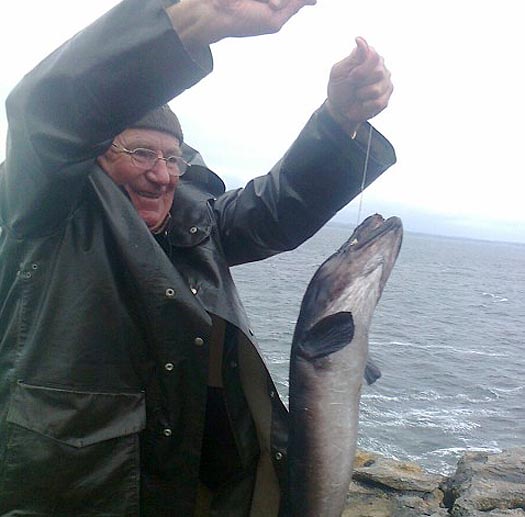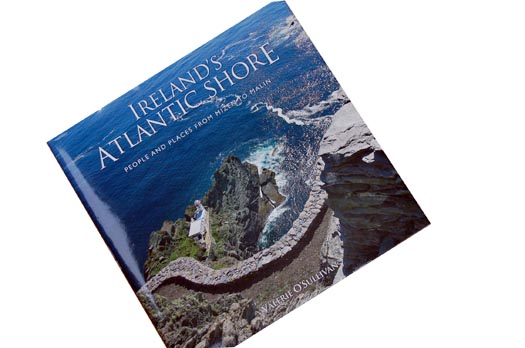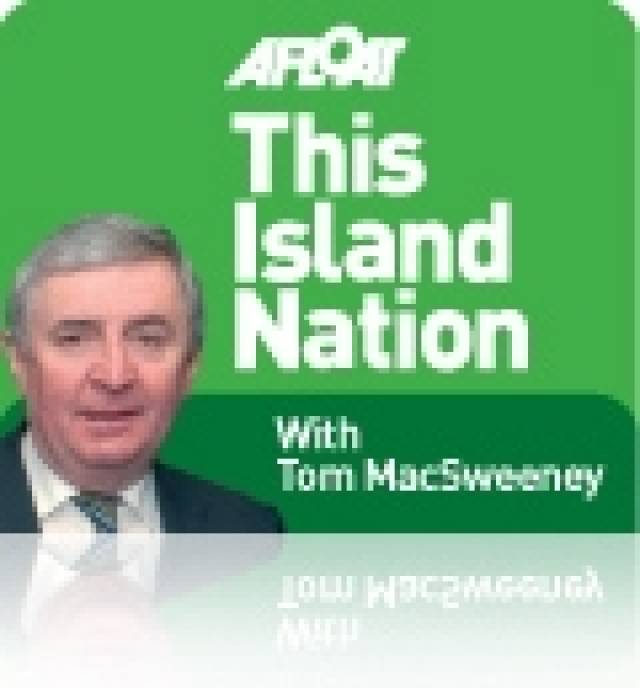#islandnation – Denying ships refuge when in trouble is a questionable policy... a sea watch tower in Dun Laoghaire... Two World Presidents from Ireland ... Angling is good this November and the people of Malin to Mizen, all in this week's THIS ISLAND NATION marine round-up ....
RESPECT FOR SEAFARERS
Every country needs ships to obtain supplies of the goods they need and to export what they want to sell, but do they give enough respect to the seafarers who sail those ships?
Emergency rescue assistance is provided, but what about providing a port of refuge when a ship is in trouble and seeks help?
Increasingly nations, including Ireland, have shown themselves somewhat unwilling to help in this regard. There can be justifiable reasons, such as the dangers of pollution or other threats to life or of damage in port from the condition of a ship. However, denying a port of refuge could also increase the potential level of pollution and damage.
The case of the badly-damaged German-flagged containership, the 6,732 teu MSC Flaminia which spent nearly two months at sea trying to find a country which would allow it to dock has illustrated this, but the ship does also raises questions about the transport of dangerous goods in containers. There were 2,876 containers aboard the ship, 149 were classed as holding dangerous goods. A fire and explosion occurred in one of the ship's holds while on passage from Charleston in the USA to Antwerp.
Two crew members were killed fighting the fire and the vessel was abandoned by the remaining 22 as it listed ten degrees due to the cargo shifting and water used in the fire-fighting. Seven ships went to their aid. They were picked up by the tanker DS Crown. Three were transferred to the containership MSC Stella which took them to the Azores for medical treatment. The rest were landed in Falmouth where they were looked after by The Mission to Seafarers.
Salvage tugs, including the Dutch Fairmouth Expedition and the UK Anglian Sovereign brought the blaze under control and took the ship, which had considerable damage, in tow. Three cargo holds were destroyed, but the engine room, stern section, accommodation and forecastle were not damaged. Then the problem of where to bring it started. The UK, the Netherlands, France, Belgium, Spain, Portugal and even Germany where the ship is registered, all refused to help as the owners and the salvage companies sought a port where they could discharge and decide on repairs. The reason was that the ship was considered to be a potential floating timebomb. Many of the items listed under the International Maritime Dangerous Goods Code were aboard.
The owners, Redderei NSB, kept the ship at a position 240 nautical miles south-west of the British coastline as they sought a port. Their CEO, Helmut Ponath, said it was "shocking that a ship under the German flag" was not being given permission from European countries to enter a port of refuge.
NAUTILUS seafarers' union senior national secretary Allan Graveson said flag states had a responsibility to help and the case of yet another ship being refused a port of refuge was disturbing and of great concern to the safety of seafarers.
After waiting for two months, the German government eventually had to accept their responsibilities as the country where the ship was registered and allow it into Wilhelmshaven where no pollution or other difficulties occurred as it was unloaded and assessment of repair work began.
The lesson of the November 2002 sinking of the oil tanker Prestige off Spain has apparently, not been learned. Then the Spanish Government refused the request of the Captain for help and wouldn't allow his ship into port. A subsequent oil spill could have been prevented had they helped him. It was worse as a result and then, typically of governments rather than admitting to their own failures, they arrested the Captain who had tried to avert the disaster.
On November 13, 2002 the tanker had sent out a distress call, requesting an emergency tow to the nearest port. One of its oil tanks had ruptured and the ship had developed a dangerous list of thirty degrees to starboard. The crew had correctly counter-ballasted the vessel with two portside wing tanks. Fearing the shop might sink at sea, Captain sought permission to get the Prestige into port, where the oil could be pumped out, but the Spanish refused to help. The vessel was off the Galician coast. The Spanish Government ordered that it towed further out to sea, the French Government did the same, fearing an oil spill near their coast. When their orders were complied with the Captain's concern was proved correct, the ship breaking up from the pressure of the seas and sinking 130 miles off Spain. The resultant pollution need never have occurred had the problem been dealt with in a port.
• Jack Devanney of the U.S. Center for Tankship Excellence has published a paper which is available on the web, "The Consequences of Providing and Refusing Refuge." It examines all the coastal state refusals and provisions of refuge to stricken vessels. From his organisation's data there is only one case where provision of refuge resulted in a sizeable (2,000 ton) spill at the refuge provider. On the other hand, there are cases where failure to provide refuge turned smallish to moderate spills into two huge spills totalling 160,000 tons. In both cases, almost all the oil came ashore in the countries which had refused to provide help. "We have identified at least 10 casualties in which provision of refuge very likely prevented a 200,000 ton plus spill," he says and adds: "Enlightened self-interest can be a strong reason for providing refuge."
Environment – DUBLIN BAY VIEWING TOWER
The National Maritime Institute is examining the possibility of providing a viewing tower for Dublin Bay which would be in the spire of its museum building in Dun Laoghaire. It could cost more than €300,000. Institute Secretary, Breasal O Caollai, told its annual meeting that it would help financially, create jobs and be a tourist attraction for the area.
Sailing – TWO IRISH WORLD PRESIDENTS
It is good to see two Irish sailors honoured internationally and good for the sport of sailing here.
Kinsale Yacht Club's Paralympic sailor John Twomey has been appointed President of the International Association for Disabled Sailing (IFDS) for a four-year term. This honour comes only months after John competed at his 10th Paralympics, a record for any Irish person competing at either the Olympics or Paralympics.
Robin Eagleson of Lough Erne Yacht Club has been elected World President of the International J/24 Class Association, the World's largest keelboat class, which has usually elected its President from the North American fleets. Robin was instrumental in bringing the BMW J/24 European Championships to Howth last year. The World Championships – also sponsored by BMW - are coming to Howth in August 2013.
Angling – ACTIVE ANGLERS AROUND THE COAST

Willie Hartley and the heaviest fish caught in County Clare
Anglers are enthusiastic sportsmen and women, as well as children and around the coast, despite changing weather and river conditions which dictate the type of fishing and species which can be caught. Weather for November has generally been kind to anglers so far with plenty of activity both in freshwater and at sea. Prospects continue to look reasonably good although, the forecast is for colder days ahead, according to Inland Fisheries Ireland. At sea, flounder fishing is becoming popular at this time of year, with good catches reported from the East Coast and North Clare where conger up to 10 kilos have been caught from rocks with Willie Hartley catching the heaviest fish of 10.6 kgs for this year in the local club, as you can see in the accompanying photograph from Ken O'Neill and Inland Fisheries Ireland. Cork Harbour anglers have reported an increased level of cod.
My Book Choice – IRELAND'S ATLANTIC SHORE
Photographer Valerie O'Sullivan has captured stunning images of Ireland's Atlantic shore and the seven counties and people from Mizen to Malin whose shores are touched by this ocean in this book.

Accompanied by script observations, the beauty of this rich landscape comes across, as well as the life and activities surrounding the sea in those counties, including regattas, festivals, pilgrimages, even fair days, as seen by fishermen, farmers, windsurfers and tourist visitors. Valerie is a full-time photographer based in Killarney and a regular contributor to the Irish media. Her work has won many awards. Her striking images capture the essence and unpredictability of the Atlantic Ocean as it embraces Ireland.
• Published by Collins Press in hardback at €24.99.
• Your comments on THIS ISLAND NATION are very welcome. Email: [email protected]
• TWITTER @TomMacSweeney































































